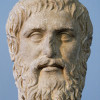“ Then persons of worth, even if only mortal men, must not be represented as overcome by laughter, and still less must such a representation of the gods be allowed. ”
Plato, The Republic. copy citation
| Author | Plato |
|---|---|
| Source | The Republic |
| Topic | laughter worth |
| Date | |
| Language | English |
| Reference | |
| Note | Translated by Benjamin Jowett |
| Weblink | http://www.gutenberg.org/files/1497/1497-h/1497-h.htm |
Context
“Yes, I replied; but that surely is what ought not to be, as the argument has just proved to us; and by that proof we must abide until it is disproved by a better.
It ought not to be.
Neither ought our guardians to be given to laughter. For a fit of laughter which has been indulged to excess almost always produces a violent reaction.
So I believe.
Then persons of worth, even if only mortal men, must not be represented as overcome by laughter, and still less must such a representation of the gods be allowed. Still less of the gods, as you say, he replied.
Then we shall not suffer such an expression to be used about the gods as that of Homer when he describes how
'Inextinguishable laughter arose among the blessed gods, when they saw Hephaestus bustling about the mansion.'
” source
It ought not to be.
Neither ought our guardians to be given to laughter. For a fit of laughter which has been indulged to excess almost always produces a violent reaction.
So I believe.
Then persons of worth, even if only mortal men, must not be represented as overcome by laughter, and still less must such a representation of the gods be allowed. Still less of the gods, as you say, he replied.
Then we shall not suffer such an expression to be used about the gods as that of Homer when he describes how
'Inextinguishable laughter arose among the blessed gods, when they saw Hephaestus bustling about the mansion.'
” source


